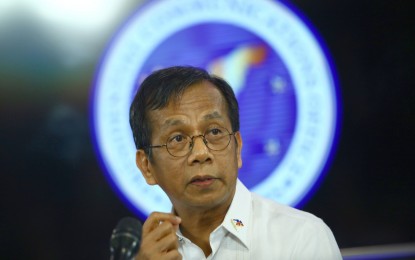
National Economic and Development Authority Secretary Arsenio Balisacan. (File photo)
MANILA – National Economic and Development Authority (NEDA) Secretary Arsenio Balisacan has spelled out the need and benefits of implementing the Administrative Order (AO) 20 signed by President Ferdinand R. Marcos Jr. last April 18, which eases the importation process for agricultural products.
In a statement Thursday, Balisacan said food insecurity and poverty will only exacerbate if the country fails to augment local production during shortages.
He said the high prices and faster inflation rate are indications that the domestic agricultural production is inadequate to meet the demand for key food commodities.
The NEDA chief recognized that there are several internal and external factors that affected the supply of agricultural products in the domestic market.
“These include geopolitical conflicts between Russia and Ukraine, the continued spread of African swine fever (ASF) and Avian Influenza, as well as typhoons and weather disturbances intensified by climate change,” Balisacan said.
He said the consequences of not meeting the food demand go beyond mere economic strain.
Balisacan said the food insecurity and higher prices of food will have lasting implications on the development and well-being of Filipino children.
“With our country currently facing a learning crisis, stunting and malnutrition are serious issues that can be exacerbated by food insecurity,” he said.
“It must be pointed out that high food prices disproportionately affect the poor, as food constitutes about 61 percent of the total expenditures of the bottom 10 percent of Filipino households,” he added.
He noted that in 2022, 52.4 percent of Filipino households were considered food insecure. In the same year, 3.7 million Filipino children under the age of five experienced stunted growth, ranking among the highest in Southeast Asia.
“Thus, failing to manage food prices seriously jeopardizes the welfare and long-term development of our children and undermines the Marcos Administration’s goal of significantly reducing poverty to single-digit levels by 2028,” Balisacan said.
He said not responding to food supply concerns will further increase food prices and accelerate inflation, and to counter this, the Bangko Sentral ng Pilipinas may choose to raise key policy rates or keep interest rates at a high level for a prolonged period to ease inflation.
“However, this approach can slow down the momentum of our rapidly expanding economy, and opportunities for business expansion and job creation are foregone,” Balisacan said.
“This undesirable trade-off runs counter to our development agenda and the Marcos Administration’s aggressive efforts to promote the country as a premier investment destination of choice,” he added.
Pro-importation?
But Balisacan said while the government eases inbound shipment policy for agricultural products, “neither NEDA nor the government is biased toward importation.”
“Rather, the government bears the responsibility of utilizing various instruments in its arsenal of policy tools to stabilize prices while performing a delicate balancing act,” he said.
He added that the government’s commitment to improving the welfare of farmers and raising local productivity is “unwavering.”
He said in terms of budget allocation for the agriculture sector, average appropriation for the Department of Agriculture grew 69 percent in 2022 to 2024 period from 2017 to 2021 period.
“These resources are expected to be translated into investments and interventions that will make the sector more competitive over time,” Balisacan said.
On the other hand, he said the impacts of the current measures to raise farmers’ yields and increase their income takes time to materialize, as the complex and multifaceted challenges in the Philippine agriculture sector run deep.
“Overall, the Marcos Administration remains committed to ensuring food security and promoting economic growth while protecting the welfare of our farmers and consumers. Administrative Order No. 20 is not merely about importation; it is a strategic move to foster greater transparency and predictability in policies related to importation,” he said.
“By creating an enabling and responsive policy environment, we pave the way for inclusive growth and durable poverty reduction. Let us remain committed to our vision of a prosperous Bagong Pilipinas, where no Filipino is hungry or left behind,” he added. (PNA)
